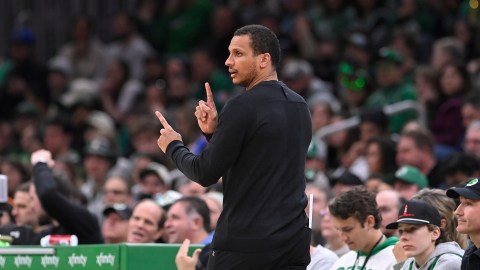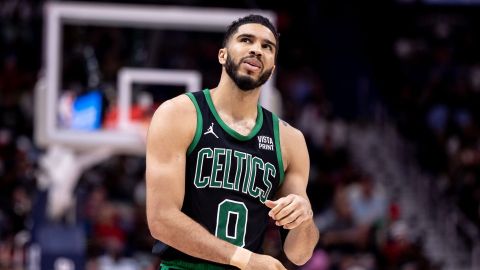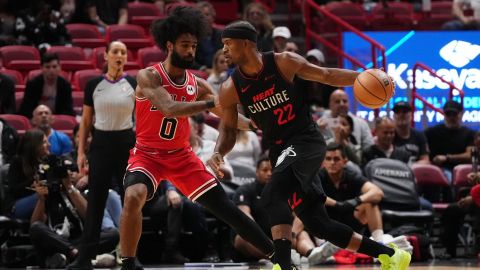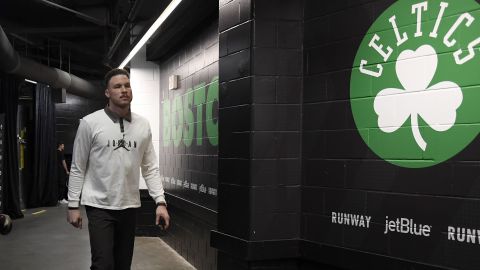With eight minutes left in the third quarter of Game 7 of the NBA Finals, the Celtics had a double-digit lead securely in hand at 49-36. Game over, right? Perhaps with most teams you could say that, but not for the Celtics, who watched Game 7 slip away last month. It's a problem that exposed itself on the game's biggest stage, and there's no solution in sight. Will the Celtics stop blowing second-half leads?
We knew this was a problem for the Celtics well before Kobe Bryant and the Lakers picked them apart at the Staples Center in Game 7. In fact, it was a problem so bad that L.A. coach Phil Jackson called them out for it on national TV during the Finals. As the Celtics were taking down the Lakers in Game 5 at the TD Garden, Jackson was trying to lead his guys back into the game when he dropped the bomb.
"This team has lost more games in the fourth quarter than anybody in the NBA," said the Zen Master, captured during a timeout by ABC for all the world to hear. "They know how to lose in the fourth quarter. They're just showing us that now."
The Celtics won the battle, winning 92-86 and took a 3-2 series lead, but Jackson's Lakers won the war. But it wasn't just the Finals. The Celtics' habit of letting games slip away late was a recurring storyline all year long.
- December 27, at Los Angeles. The C's lead by double digits, 71-61, late in the third quarter against the Clippers. They cough it up, Baron Davis nails a jumper at the buzzer, and it's a 92-90 loss for Boston. Turning point in the season for a team that started 23-5.
- January 8, at Atlanta. They lead the Hawks at the break, 45-39. Jamal Crawford goes off in the second half, hits a couple of ridiculous 3's late, and the Hawks steal one, 93-85.
- January 11 against the Hawks. A rematch with the Hawks — the C's go up 12 just after halftime, as Ray Allen nails a 3 to start the second half, making it 58-46. Then they go cold the rest of the way, Joe Johnson heats up, and it's a 102-96 final.
- January 18, against the Mavericks. Same situation. This time, it's Paul Pierce hitting a 3-pointer to start the second half with a 12-point lead, 53-41. But then Dirk Nowitzki catches fire, and the Mavs close the quarter on a 34-15 run. Forget it. Game over.
- January 28, at Orlando. Another double-digit lead blown. The C's lead 51-40 at halftime, the Magic come back, Rashard Lewis beats them with a layup on the final play. Magic 96, Celtics 94. A shocking loss in a pivotal Eastern Conference grudge match.
- January 31, against the Lakers. Led the Lakers at halftime by five, 52-47. Lost in the final seconds to a dagger from Kobe, 90-89.
- February 7, against the Magic. An identical halftime lead to their previous duel with the Magic, 51-40. This time, it's a more lopsided loss. 96-89 is your final.
- February 27, against the Nets. They open with a 12-2 lead against the worst team in the NBA. Somehow, they choke it away.
At the root of the problem is the Celtics' age. When players reach their early or mid-30s, they tire easily. It could be that simple.
If Pierce sees an opening to drive to the basket, does he go for it? Or does he throw up the jump shot, figuring it's almost as good a play? If the shot goes in, all's forgiven. It's the easy way out.
When Pierce was 22, there was no doubt he'd attack the basket. But he's 32 now.
Same for Ray Allen. Same for Kevin Garnett. Same, obviously, for Rasheed Wallace, who mailed in entire games for much of the regular season. All these guys had their moments of late-game laziness — and they had them on both ends of the floor. Defense wins championships, and it also maintains double-digit leads in January. The Celtics didn't always have it.
In the playoffs, the Celtics rediscovered their sense of urgency. But even when the games mattered most, the C's couldn't sustain their effort — look no further than Game 7 in L.A. That loss tells you everything you need to know.
The Celtics were an old team. And even if Rasheed retires and Michael Finley walks away, it still won't change much. The C's will remain old.
If they want to play with urgency for all 48 minutes, it has to start with sustained energy, and that energy has to come from the Celtics' younger, livelier players. The pressure is on Rajon Rondo, Glen Davis and Nate Robinson to lead the movement.
Game 7 was painful for the Celtics' players, coaches and fans alike. They've got to work hard to make sure it never happens again.
NESN.com will answer one Celtics question every day in July.
Sunday, July 25: Can Celtics improve rebounding?
Tuesday, July 27: Will the Celtics play better at home?



